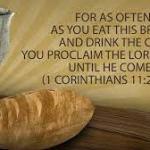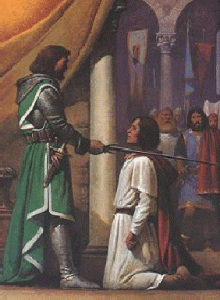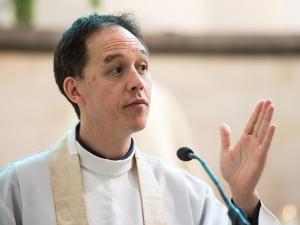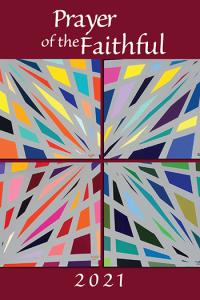
Celebrations of Grace: The Sacraments of the Catholic Church, Part 9
We live in a world of grace. We are always in God’s presence, and this presence, this grace, is always pushing us to celebrate, especially through the sacraments. But God’s grace leads us to do many things. How important for us is our participation the sacraments?
Celebrating together
Imagine a family getting together at Grandmother’s house or a community getting together for a fireworks display. We celebrate because of what we are; we don’t really expect to gain something from the celebration.
But now imagine there were no get-togethers, no Thanksgivings, no birthdays, no Christmases, no anniversaries, no Fourth of July or Memorial Day. Imagine there were no family meals, those ritual family get-togethers when day-to-day life is shared and honored along with food (and the work that meals require). Without gathering to celebrate what it means to be individuals, family, and community, we forget a large part of our identity. Important things happen every day, but they lose some of their meaning when we no longer celebrate them. There is no special time for them to become part of a family or community story.
After a while the virtues that connect us together as individuals in families and communities and the hard work and commitment that it takes to get us from where we are to where we need to be just don’t make as much sense as they used to. They can’t compete with the easy “values” of an entertainment- and convenience-oriented culture. Families and communities need celebrations.
It is the same in the family of the Church. We experience something of great value—the presence of Jesus among us—in a thousand ways, in our joys and sorrows, in our work and triumphs and failures, in our hopes and fears. So we come together to celebrate our life, our gospel vision of Jesus in our midst. We tell our stories, and our lives are interwoven with other lives in the stories.
Celebrations, not parties
We come to the celebration because of what God has made us, but we’re hardly ever more than partially aware of what that is. Hesitant and weak, failing as often as succeeding, we remember some things but forget much more. In the celebration we realize anew our true identity. We leave the celebration with our sight cleared, our faith and commitment strengthened, our memory and our courage restored. We must celebrate the sacraments. Without them we can’t go on very long any more than families and communities can without their celebrations.
How we feel about getting together in big family gatherings varies from individual to individual in any family. But all gather to celebrate. It’s the same with the sacraments. Some of us are passionately devoted to the presence of God in the Eucharist, for example, but not all feel that way. God has given us many things to be passionate about—family, community, friendships, work, play, peace and justice, nature, beauty, even abstract ideas. We meet God in each one of these passions and in our sorrows and hurts, too.
No matter how moving our liturgies are or how highly we value them, we have more to be stirred up about than what happens in liturgy. That’s why we call our liturgies celebrations, not parties that you can throw without anyone asking, “What’s the occasion?” Celebrations are about something—valued things that have happened or that are there all along. Christians often are passionate about their celebrations and God’s presence there. They necessarily are passionate about what is celebrated—the encounter with a saving God in their lives.
If not for our faith that God is with us in many different ways, God’s presence in the sacraments would mean much less.
Grace completes grace
We do not always feel like celebrating because we do not always see God’s love around us. Or we do see love but fail to recognize it as from God. Sometimes we just don’t feel any grace, peace, love, strength, wisdom, or courage. So coming together regularly with the community that possesses God’s love and celebrates it Sunday after Sunday is important.
Sacraments show clearly the reality that we often miss behind tarnished and distorted images. What leads us to the sacraments is, first, a push, a need to celebrate the grace we already possess. But it’s also the drawing power of sacramental grace, the anticipation of receiving just what we need from the celebration. The second grace completes the first, which is always there, underneath it all, but not always easy to see or believe in.
If not for sacramental celebrations and the grace we find there, our faith in God’s presence in our lives would sooner or later become mere words and a faded memory of words.
Grace’s leading edge
What happens in the sacraments is a special work of God. God’s saving work, through all of time and space, fulfilled at one place and time by Jesus and continuing everywhere today, is all at once taken up into the symbolic actions of the sacraments. We are led to that grace by a whole world of grace. Grace runs before the sacraments, and even before the Church. We celebrate the sacraments, and Jesus brings us to the front and pushes us ahead. In every age Christians make sacrifices and sometimes risk their lives to gather and celebrate their world of grace, the closeness of God in all their joys and trials. Because they do, our world becomes more grace-filled still.
Think again:
What makes the liturgy a celebration as opposed to a party? Is there something about your life that helps make sacraments more meaningful to you than they otherwise would be? What is it about the sacraments that make your life more meaningful than it otherwise would be?
Image credit: Beliefnet via Google Images












